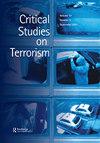Terrorism and politically motivated violence in the recent history of the Basque Country. Descriptive study of what teachers in training know
IF 2.5
Q2 POLITICAL SCIENCE
引用次数: 0
Abstract
Ever since ETA declared that it would no longer carry out acts of violence, the Basque Country has been involved in a peace process. As part of this process, the Basque government has promoted – through its Adi-adian Educational Module – the experience of listening to victims’ testimonies in order to inform young persons about an important chapter of our recent history. Reflecting an awareness of the importance of addressing socially relevant topics, the University of the Basque Country (UPV/EHU) began to implement the Adi-adian model in a number of its bachelor’s and master’s degrees in teacher training. With a view towards improving the implementation of Adi-adian, a statistical-descriptive study was carried out with a quantitative methodological approach. Using a 25-item questionnaire, the purpose was to measure knowledge of recent historical events, determine the sources of information concerning those events, and gauge the satisfaction of participants as regards the information that they have received about the violent episodes of their recent history. The statistical analysis of the data obtained in this study was conducted using the SPSS Statistics 27 software. Generally speaking, the participating students were found to possess an average to low knowledge of the events that took place during the recent history of the Basque Country. As for the sources of information cited, the family, the media and the school are the most frequently mentioned, while respondents express a generalised dissatisfaction with the information received in this regard.巴斯克地区近代史上的恐怖主义和政治暴力。对教师培训知识的描述性研究
自从埃塔宣布不再实施暴力行动以来,巴斯克地区就被卷入了和平进程。作为这一进程的一部分,巴斯克政府通过其adii -adian教育模块,宣传听取受害者证词的经验,以便让年轻人了解我们近代历史的重要篇章。巴斯克地区大学(UPV/EHU)意识到解决社会相关问题的重要性,开始在若干教师培训学士和硕士学位课程中实施阿迪阿迪安模式。为了改进adiadian的执行,用定量方法进行了一项统计描述性研究。使用一份25项的调查问卷,目的是衡量对最近历史事件的了解,确定有关这些事件的信息来源,并衡量参与者对他们收到的关于他们最近历史中暴力事件的信息的满意度。本研究所得数据采用SPSS Statistics 27软件进行统计分析。一般来说,参与研究的学生对巴斯克地区近代历史上发生的事件的了解程度一般或较低。至于所引述的资料来源,受访者最常提到的是家庭、传媒和学校。受访者对所获的资料普遍不满意。
本文章由计算机程序翻译,如有差异,请以英文原文为准。
求助全文
约1分钟内获得全文
求助全文

 求助内容:
求助内容: 应助结果提醒方式:
应助结果提醒方式:


